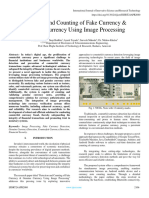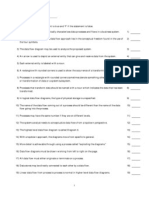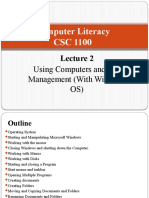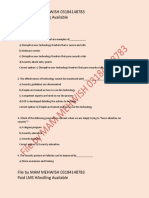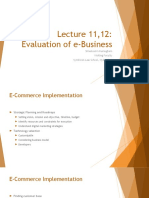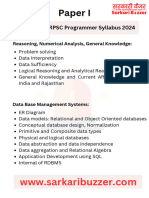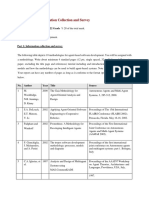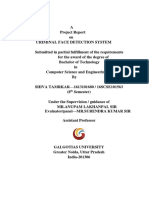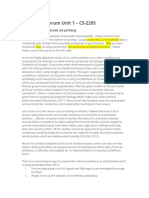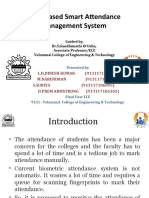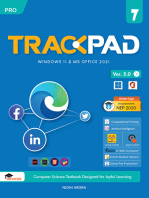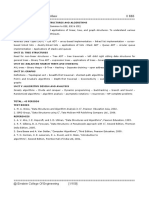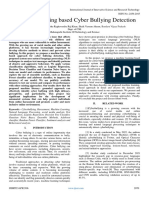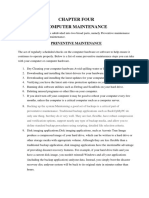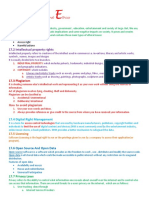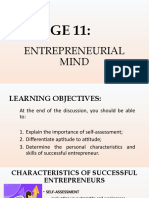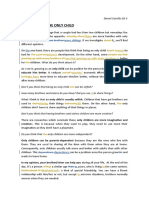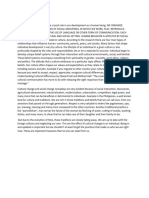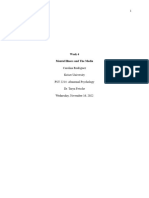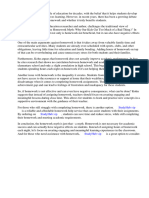Professional Documents
Culture Documents
The Students' Assessment of Family Influences On Their Academic Motivation
The Students' Assessment of Family Influences On Their Academic Motivation
Original Title
Copyright
Available Formats
Share this document
Did you find this document useful?
Is this content inappropriate?
Report this DocumentCopyright:
Available Formats
The Students' Assessment of Family Influences On Their Academic Motivation
The Students' Assessment of Family Influences On Their Academic Motivation
Copyright:
Available Formats
Volume 9, Issue 4, April – 2024 International Journal of Innovative Science and Research Technology
ISSN No:-2456-2165 https://doi.org/10.38124/ijisrt/IJISRT24APR691
The Students’ Assessment of Family Influences on their
Academic Motivation
Precioso L. Tano, PhD Carol P. Tano, MAT
Faculty, Philippine School Doha, Faculty, Philippine School Doha,
Doha, State of Qatar Doha, State of Qatar
Abstract:- Family is the basic unit of the society where the I. INTRODUCTION
child’s upbringing must start since his or her birth. The
home is very pertinent and pertinent to a child’s well-being Many of the students of Philippine School Doha faced
and development in later life. It is assumed to have with different struggles and challenges in lives, specifically in
significant influences over the students’ academic their academic ventures. This study aims to disclose the
motivation and success. Researchers believed that the students’ assessment and lived experiences on how family
obligation of the family to a child at any given time cannot influences affect their academic motivation since the family
be exaggerated. plays an important role and serves as the main foundation of
the student’s learning.
Phenomenological research design was used by this
qualitative paper to recognize the assessment and lived Family is the basic unit of the society where the child’s
experiences of the respondents, categorically the students upbringing must start since his or her birth (Grace, Jethro, &
of Philippine School Doha, parallel to the central question: Aina, 2012). The home is very pertinent and pertinent to a
“How do the students assess the family influences on their child’s well-being and development in later life (Grace, Jethro,
academic motivation?” The researchers gathered the data & Aina, 2012). It is assumed to have significant influences
through a robotfoto and twenty semi-structured interview over the students’ academic motivation and success.
questionnaires. The data were analyzed using an inductive Researchers believed that the obligation of the family to a
approach. child at any given time cannot be exaggerated. The
individual’s principles established since childhood is like
Findings have shown that familial background, letters engraved in the bark of a young tree, which grows,
familial expectation, familial interaction, and familial enlarge with it making its integral part (Grace, Jethro, & Aina,
involvement between and among family members greatly 2012). Thus, the correct beginning makes the most important
influenced students’ academic motivation and success. part of education. Negligence of the parents to meet these
particular needs can have wide-ranging and long-lasting
For every student, they have their familial adverse effects (Grace, Jethro, & Aina, 2012). It is because the
background, familial expectation, familial interaction, and parents at home are the children’s first teachers.
familial involvement that work hand in hand that
influenced their academic motivation and success. The influence of parents and the family as a whole on
children’s accomplishment is well documented by researchers
This paper suggests that future researchers to expand in several studies. Studies say that greater parental
the number of respondents further to have a broader involvement at an early stage in children’s learning
range of responses. The respondents chosen should be conclusively affects the children’s school performance,
coming from different levels from different educational including higher academic accomplishment. (Gadsden, 2003).
institutions to check whether all students would share the Indeed, family influences palpably and consistently have
same type of responses. significant effects on students’ accomplishment and
adjustment, which far exceed other forms of influences.
Keywords:- Assessment, Family Influences, Academic
Motivation, Philippine School Doha, Familial Background, When there is a strong support system of the families to
Familial Expectation, Familial Interaction, and Familial learning, students tend to succeed not just in school, but
Involvement. throughout the students’ life. The exact predictor of the
students’ motivation and accomplishment in school is not the
social status, but the extent to which that students’ family can
create a home environment that stimulates learning and to
express high expectations for the students’ future endeavors
(Grace, Jethro, & Aina, 2012).
IJISRT24APR691 www.ijisrt.com 210
Volume 9, Issue 4, April – 2024 International Journal of Innovative Science and Research Technology
ISSN No:-2456-2165 https://doi.org/10.38124/ijisrt/IJISRT24APR691
Moreover, family influences have consistently been The participants consisted of seven, of which were
showing to relate to numerous outcomes such as child coming from different schools when they entered Philippine
psychological problems, academic motivation, and School Doha. The researchers selected them via a qualitative
performances (Querido, Warner & Eyberg, 2002). Family purposive sampling strategy (Moen and Middelthon, 2015).
influences, including supportiveness and warmth continue to The selection of the preferred participants was situated by the
play an essential role in influencing students’ academic researchers on the following criteria, (a) students who were
accomplishments and performances. officially enrolled in Philippine School Doha. (b) new students
in Philippine School Doha.
Within this study, this research covered the assessment
and lived- experiences of the students of Philippine School Furthermore, a small sample of larger population size
Doha who have from different familial backgrounds with was implemented to avail of their knowledge within the
different familial expectations and different levels of familial phenomenon of interest and served as representatives who met
interaction and familial involvement towards academic or exceeded the said criteria (Palinkas, et al., 2013). The main
undertakings. advantage of this small sample is that the researchers can
reach the targeted sample quickly.
II. METHOD
Data Collection and Ethical Consideration
Research Design The data in this research study were gathered through a
The researchers utilized the principle of qualitative robotfoto together with the twenty semi-structured interview
research and the phenomenological approach as their research guides (Kelchtermans & Ballet, 2002; Garcia & Acosta,
design. Since qualitative research always keeps the big picture 2016). The robotfoto looked for the demographic sketch of the
in mind and follows a “Gestalt” perspective. The focus of participants, their personal details that include a contact
qualitative research in this study was to understand the whole number, email address, date of birth, educational attainment of
phenomena as a whole complex, which cannot be fragmented the parents, and the number of years they stay in the State of
or reduced to a few variables. To do so, the researchers would Qatar. The participants were provided with twenty questions
yield a lopsided result that would not be faithful to the that allowed them to share their thoughts, lived experiences,
participants’ real situation (Tayade, 2019). and feelings that contributed to gaining information.
The researchers were required to seek variations within Before the actual interview, a consent form was given to
the confines of phenomena and investigate the rationale in the the participants. It served as evidence for the respondents’
discourse of analysis and narrative inquiry in differing explicit approval; included was the assurance of confidentiality of
and implicit philosophies (Elliot, et al. 2007). Thus, the their data and responses. The researchers handed a
researchers employed the narrative approach in putting all the questionnaire form to the participants that allowed the smooth
data through findings and discussion. A narrative, like most of flow of the interview (De Guzman, 2007). Moreover, the
the other qualitative approaches, is an umbrella term collected data were transcribed verbatim with the aid of the
encompassing a variety of methods. The narrative is simply recording gadgets. The researchers assured the participants
straightforward, a story told in a clear chronological order that that their responses would be handled with utmost animosity
coherently connects events for a focused audience. These and confidentiality (Sisno, 2017, Kayed & Hassan, 2012). The
stories serve as windows into the lives of the participants, researchers made use of field notes during the interview
which the researchers were able to obtain a greater process and were compiled for better interpretation of the
understanding of their life and their experience (Taylor, 2020). transcribed data. Such reminded the researchers of the
As such, the researchers rightfully observed that narrative respondents’ behavior, impression, verbal and non-verbal
conciliates between an inner world of though-feeling and an cues, and the context in the course of the interview. The
outer world of observable actions and states of affairs interview covered approximately forty minutes in length, and
(Mattingly and Garro, 2000). transcription of the data taken for two days (Sutton & Austin,
2015). The researchers used the pseudonyms to denote each
Research Locus and Sample respondent for confidentiality (Moen & Middlethon, 2015).
The researchers conducted the research study in the
Philippine School Doha – one of the Philippine School Data Analysis
Overseas in the Middle East. Philippine School Doha has Encapsulating the respondents’ assessment regarding the
served as a foundation and home for many different students phenomena of the research was the most vital component of
who have developed into smart and independent students. It is this study (Sutton & Austin, 2015). To further decrypt the
well known for its service and excellence, making the Filipino phenomenon of this study, the researchers made use of the
community satisfied for their act of assistance and high- phenomenological methods (Phillips-Pula et. Al., 2011) while
quality education. engaging in a systematic approach of arranging, considering,
and organizing the chronology experiences uttered by the
IJISRT24APR691 www.ijisrt.com 211
Volume 9, Issue 4, April – 2024 International Journal of Innovative Science and Research Technology
ISSN No:-2456-2165 https://doi.org/10.38124/ijisrt/IJISRT24APR691
participants (Moen & Middleton, 2015). The following Familial Background
procedures were observed throughout the study: (1) It is no doubt that family background influences
transcribed the recorded data in a verbatim manner; (2) read students’ academic motivation. The data collected showed that
and re-read the respondents’ view of phenomenon; (3) the students’ parents are all professionals in their own chosen
constructed emic and reconstructed etic perspective; (4) field, and they held decent and stable positions. For these
extracted significant statements from the respondents’ reasons, the socioeconomic status of the students’ families is
viewpoints and created a compilation of these statements; (5) high. Thus, they can provide the required essentials needed for
analyzed and comprehended similarities of the respondents’ the students’ education.
responses to create unit thoughts; (6) sorted and grouped these “My parents are both working in Ooredoo. They are both
thought units through a dendrogram (Acosta, 2010); (7) office administrators." (S5)
formulated a figure or simulacrum representing the complete “My father is a Radio Technician, and my mother is a
findings of the study; (8) validated the emerged themes secretary in a prestigious company.” (S6)
through critical inspection to guarantee reliability and quality “My mom is a nurse, and my dad is working on a logistics
of the interpretations (Kelchtermans & Ballet, 2002). company.” (S7)
The analysis of data was done in an inductive process, The data showed that the respondents belong to a
writing marginal notes on the transcribed data and later conventional family, wherein they are living in a simple and
following the flow of the findings to verify the emerging peaceful life- full of joy. Considering that the respondents
themes (Williamson, et al., 2017). Analysis and discussion of come from an intact structure of the family, the support system
data continued throughout the study until new categories nor and love among the members are powerful. Although the
themes would emerge, and saturation of findings was met students’ family is not perfect, they still have good, peaceful,
(Phillips-Pula, 2011). and harmonious relationships among one another.
“My family is normal though it is not perfect, but we love
III. FINDINGS and support one another.” (S1)
‘’My family lived in Qatar for 13 years. Our life is simple
Probably the most substantial impact in our lives is the but full of joy and happiness.’’ (S4)
home where we grew up. Our birth order, the personality of ‘’My family is normal ever since we were here, my family’s
our parents, the manner our siblings treated us, the decisions are what I am counting on, and I support it.’’
socioeconomic status of the family, the education, the place (S5)
we lived — all of these molded us at the time when we were
most vulnerable to being shaped (Collins, 2017). Apart from Familial Expectation
these implied influences, our parents educated and trained us Nothing in life can be more captivating and satisfying
all the basics of proper decorum and behavior (Wittmeyer, than students’ trust in their capabilities to realize a given task.
2019). Indeed, family expectations, specifically the parental
expectations, boost the students’ motivation to perform better
Honestly, parents have essential roles to play in the life in school. The researchers found out that all the students’
of a child. The participation of the parents on a child directs parents have an ambitious dream for them to have successful
the future of the child. Parenting involvement and lives in the future.
participation are catch-all term for many different activities,
“My family’s idea for me in the future is to become
which includes at home, good parenting, helping with
successful and to be a good partner and parent.’’ (S2)
homework, talking to teachers, attending school activities, to
“My family’s dream for me is to continue and support
taking part in school governance (Grace, Jethro, & Aina,
whatever I love doing and to pursue the course of dentistry
2012). When there is a strong support system of the families to
that I like. These are my family’s dreams for me.” (S4)
learning, students tend to succeed not just in school, but
throughout the students’ life. (Grace, Jethro, & Aina, 2012). “My parents want me to become successful. They love to
help and support my decisions as long as I am willing to
However, in this research, the emergent themes from the take them.” (S5)
gathered data analysis revealed that students viewed a broad “My family’s dream for me is to become successful in all
and comprehensive scope of sources of family influences on my endeavors to have a good salary income and have a
academic motivation. The data visualize such family comfortable life. They love to see me working in the
influences that show a significant impact on the students’ pharmacy.” (S6)
motivation towards school. Depending on some
circumstances, it discerned that these family influences are The parental expectations served as constant reminders
being categorized into four, namely familial background, whenever the students feel lazy and discouraged because they
familial expectation, familial interaction, and familial had a hard time coping up with all the school works (Quion,
involvement. 2017). Students’ performances and achievements greatly
influenced by the words of encouragement, motivation, and
IJISRT24APR691 www.ijisrt.com 212
Volume 9, Issue 4, April – 2024 International Journal of Innovative Science and Research Technology
ISSN No:-2456-2165 https://doi.org/10.38124/ijisrt/IJISRT24APR691
persistence of the parents to their children to perform better in siblings. Nevertheless, I am trying my best to connect and
the school. build a good relationship with them.” (S6)
“My family encourages me, but sometimes it hurts when
they do not see my efforts. They sometimes do not believe The interaction between and among the family members
that I did my best to study hard.” (S3) often challenged due to some family values and practices-
“My family always reminds me to do my best. I know my these include opposing each other’s plan to do on weekends,
parents are working hard, and the only that I could repay comparing one child to another child, being dishonest, and
them is through studying hard and having good grades.” arguments of the parents. Nonetheless, family bonding- like
(S4) attending mass, eating meals together, going out every
“My family’s expectation encourages and influences me weekend, and showing respect help resolve these minor
because I am the type of person that will leave all my concerns.
school works and just rest, but because of them, they “I dislike the arguments of my parents because it affects
motivate me to push and strive harder and think about the whole family and me.” (S1)
positive things even though I am going through a hard time “I tend to get upset when they are opposing each other’s
in the school.” (S6) plan to do at the weekend.” (S2)
“My family’s expectations help me to become more “I do not like it when my parents compared me to other
persistent in my studies.” (S7) students and other children because it puts my efforts in
becoming a better student away.” (S6)
Familial Interaction “The practices that I like in my family is bonding
Familial interaction mentions to both verbal and together.” (S1)
nonverbal information exchanged between and among the “I like going out every Thursday because it is our family
family members. It entails the ability to give attention to what bonding.” (S7)
others are thinking or feeling. “I like to go to mass and go out every weekend with my
family.” (S2)
In the same veins, the vital part of familial interaction is “One of the practices that I like is that we still have meals
not just about talking, but also listening to what others have to together even though they are all busy at work.” (S4)
say. Interaction within the family is essential because it allows
family members to convey their needs, wants, and concerns to Despite all these imperfections in every family, and the
one another. It is through interaction that family members can academic pressures, students still found many ways to subdue
resolve the inevitable conflicts that may arise with in the them. Indeed, the data showed that students still managed to
family. deal and handle all these kinds of situations and remain
positive in their lives.
The findings showed that the rapport among the family “One of the best ways to overcome these kinds of
members is well-established because they all speak the same situations, I have to take a good rest. I need to sleep well
language and dialect. It makes every member of the family to for me to have enough strength to bounce back.” (S6)
express his or her points easily. “Spending time with video games and hanging out with my
“In our family, we all speak English, Tagalog, and good friends are mostly my best ways to deal with stress
Bisaya.” (S1) and pressure in life.” (S5)
“At home, we use Filipino language, and we also know “Despite all the criticisms that I received. I still managed
how to speak Kapangpangan.” (S2) to remain optimistic and took them as advice for me to
improve.” (S2)
Furthermore, the findings showed that every family
member in the family also shared the same interests and Familial Involvement
hobbies. Thus, it creates a closer bond and builds a good Based on the gathered data, parental involvement in the
relationship between and among the family members. students’ motivation congruously found to be conclusively
“My brother and I are close to each other because we associated with the students’ academic endeavors.
share the same interests and hobbies. We love being Specifically, students whose parents are more active in their
together.” (S2) education have a higher level of motivation towards school
“I am closer to my mother because she opens up a lot to works (-, 2016). Parental contribution and involvement in the
me. I can easily relate to her because we are both girls, children’s academic endeavors manifests that the students’
and we share the same interests.” (S4) parents are fully aware of the importance of their involvement.
“I am closer to my mom and my siblings, but I have “My family encourages me to study well and lessen
distance feelings to my dad. Being the middle child in the outings with my friends.” (S1)
family, I am automatically inclined closer to my mom. “They always share their experiences in academics and
However, this causes some complex relationship with my giving me advice.” (S2)
IJISRT24APR691 www.ijisrt.com 213
Volume 9, Issue 4, April – 2024 International Journal of Innovative Science and Research Technology
ISSN No:-2456-2165 https://doi.org/10.38124/ijisrt/IJISRT24APR691
“They encourage me by telling me that any effort that I Subsequently, research has verified the findings that
give to something is enough in that and I do not need to family background strongly correlated with students’
pursue myself because as a STEM student we are more performance and achievement in school. In some studies,
pressured to achieve an award and they always assure that family education, family income, and family structure are
no matter what with award or not they still love me.’’ (S6) some of the variables that may influence students’
performance and achievement. Better educated parents are
The data further showed that parental involvement in more likely to give attention the quality of education where
school undertaking makes the students more productive. they want their child to study (Egalite, 2016).
Students tend to strive harder when they know that their
family is interested in their school whereabouts. It also Highly educated parents intensify their children’s
modifies the students’ motivation and behavior not only in development and human capital by drawing on their excellent
school but also at home. language skills in communicating with their children (Egalite
“Because of my parents’ encouragement and support 2016). Highly educated parents also use their social capital to
through words and actions, I am always reminded to do advance their children’s development (Egalite 2016).
my best. I show gratitude to them by aim high always.”
(S4) Family income is also one of the variables that have a
“A simple way to show my gratitude to my parents for direct impact on a child’s academic performance and
helping my school works, for providing my needs, and for achievement. Indeed, parents with more considerable financial
giving gifts is by helping them do the household chores.” resources can use their resources to make sure that their
(S3) children have the access to a full range of extra-curricular
activities.
IV. DISCUSSIONS
Having an excellent familial background makes the
The researchers believed that every family member students more focused and motivated in their academic
benefits the assets they received from their family, not only endeavors as they have something to look after and achieve
with their financial support but also with their contributions more if not the same. They tend to choose a field where they
and influences towards a member’s primary interest (Lane, have a passion for most probably the things they have
2019). observed with their parents. They must have seen their
familial background as motivation as well to do better in the
Visualizing all these family influences, they are further school. Moreover, they tend to absorb knowledge from the
categorized based on the emerged thought units, similarities experiences they have within the family. Such would lead
between and among responses; however, all of them them to have a better school performance, which results in
synthesized in a systematic process to ensure family achievement. Lastly, turn to remain motivated to their school
influences within the members. The key to motivated and whereabouts.
successful academic endeavors lies mainly within the family,
considering the familial background, familial expectation, Familial Expectation
familial interaction, and familial involvement. Most parent’s keen interest in their children’s
performance and achievement both in education and other
Familial Background aspects of human survival (Chima & Ndukwu, 2017). That is
Family background cites all the conditions and why many parents strive and try their best to give their
circumstances in the family which affect the child physically, children’s needs (Chima & Ndukwu, 2017). Many parents
intellectually, and emotionally (Okiemute, 2017). Researchers struggle every day and do all sorts of things to care for their
pointed out that the family environment has more tendencies children (Chima & Ndukwu, 2017, Mba, 2007). Many
of increasing or decreasing the intellectual achievement of the enlightened parents believe that they can only expect great
child (Okiemute, 2017). Akubue and Akolo (2008) described performance, achievement and success from their children
family as a small kinship structural group with the vital only when the children are well provided and cared (Chima &
function of the natural socialization of the newborn. In the Ndukwu, 2017). Some parents also believe that when they
same vein, the family is defined as a primary social group of give their children with the necessary things they need, that
parents, offspring, and possibly other members of the their children will perform well in school (Chima & Ndukwu,
household (Okiemute 2017). 2017, Adebayo, 2000).
A family could be extended or nuclear. Extended Parent’s influence on their children extends to the kinds
families refer to a large group of related kin in addition to of expectations they have for their children’s school
parents and children, living together in the same household performance and achievement. Over the past half-century,
(Anderson and Taylor, 2000 as cited by Okiemute, 2017). parental expectations in affecting children’s academic
progress has received substantial from psychologists and
IJISRT24APR691 www.ijisrt.com 214
Volume 9, Issue 4, April – 2024 International Journal of Innovative Science and Research Technology
ISSN No:-2456-2165 https://doi.org/10.38124/ijisrt/IJISRT24APR691
sociologists. Generally, the parental expectations play a vital related to academic performance and achievement above and
role in children’s academic performance and achievement beyond the impact of the child’s intelligence (Topor 2010,
(Yamamoto & Halloway, 2010). Menor, Padecio, Villegas, Setinta & Regidor, 2017).
Putting much effort into accomplishing school tasks is a However, most parents nowadays are becoming less
must to address the flexibility of students’ motivation in active in the involvement of their children’s whereabouts as
school. Having lots of workloads and pressures both in school they enter the higher level. Lack of time, and work
and at home have been a huge concern for every student. That commitments, parents’ education and financial problem are
is why there is no better way to appreciate your children by some of the many barriers to parental involvement even
being flexible to them and show them that they are loved and though they want to be involved more (Karibayeva & Bogar,
valued, not just simple sets of expectations. 2014). Thus, letting the children experience a sense of being
independent. Based on the findings, parents’ willingness and
Familial Interaction understanding the importance of their involvement can solve
Generally, scholars agree that family socioeconomic all these concerns.
status and family interaction significantly influence student
involvement and motivation in school (Liu & Chiang, 2019). V. CONCLUSION
The researchers believed that interactions within the family
are critical to wellness across time (Fisher, 2015). Thus, The study revealed four terminologies: Familial
family interaction and social support from friends are the background, Familial expectations, Familial interaction, and
factors related the most to better well-being (Yubero, 2018). Familial involvement. For every student, they have their
familial background, familial expectation, familial interaction,
In this perspective, frequent interaction within the family and familial involvement that influenced their academic
is necessary for the students to succeed in their academic motivation.
endeavors. Effective interaction usually found in strong and
healthy families. However, weak interaction almost always The findings highlighted the many ways of how the
found in unhealthy family relationships. family influenced the students’ academic motivation. These
four findings worked hand in hand.
Parents’ busy schedule at work and having a lot of other
commitments would affect the drive of students for their The researchers concluded that familial background
academics. Balancing work and other commitments are the greatly influenced the students’ academic motivation. It
ways how parents keep their interaction at homework. If there included the socioeconomic status of the family, family
is a greater balance between work and home, the more structure, values, and practices. Better educated parents are
productive you and your family will become as stated by more likely to regard the quality of education where they want
(Bernan, 2002) in his study. Parents’ enough and quality their child to study (Egalite, 2016). Highly educated parents
interaction with the children greatly influenced everyone’s intensify their children’s development and human capital by
motivation in life. drawing on their excellent language skills in communicating
with their children. Indeed, parents with more considerable
Familial Involvement financial resources use their resources to make sure that their
Parental involvement is a factor that is related to a child’s children have opportunity to a full range of extra-curricular
increased academic performance and achievement (Hill & activities.
Craft, 2003). Parental involvement talks not only control
children’s educational progress, but also active participation in High and attainable familial expectations had a positive
school meetings and events, collaborating with the teachers, and significant influence on students’ self-efficacy belief. A
and helping children at home. Parental involvement is a belief can lead to high academic success and their entire life as
crucial factor during the school life of children, especially in a whole. In general, parental expectations played a vital role in
lower years (Karibayeva & Bogar, 2014). Scientists children’s academic motivation, achievement, and success.
discovered that parental involvement can affect children’s
academic performance, progress, behavior, language abilities, Familial interaction, both verbal and nonverbal,
achievement, and social skills. Generally, the perception of therefore is necessary because it enables family members to
life as a whole (Karibayeva & Bogar, 2014). convey their needs, wants, and concerns to one another. It is
also true for the student’s needs, wants, and concerns in
Parent involvement can be measured in multiple ways, school. It helps resolve the unavoidable conflicts that may
including the parents’ engagement and participation at home arise. The most important part of interaction is not just about
and school and the positive attitudes of the parents towards talking to the child but also listening to what the child has to
their child’s education, school, and teachers (Kohl, Lengua, & say.
McMahon 2000). Significantly, parent involvement was
IJISRT24APR691 www.ijisrt.com 215
Volume 9, Issue 4, April – 2024 International Journal of Innovative Science and Research Technology
ISSN No:-2456-2165 https://doi.org/10.38124/ijisrt/IJISRT24APR691
The researchers declared that the impact of familial [13]. IT PRO team, (2019). Data Scientists Jobs: Where does
involvement aroused from the values, educational aspirations the big data talent gap lie?
of the family, and these are exhibited continuously through https://www.itpro.co.uk/careers/28929/data-scientist-
parental involvement, participation, and positive parenting jobs-where-does-the-big-data-talent-gap-lie
style in the family (IT Pro team, 2019). Therefore, familial [14]. Karıbayeva, A., & Boğar, Y. (2014). To what Extent
involvement had a significant impact on the students’ does Parents’ Involvement in Middle School Influence
perceptions as learners towards their academic motivation, Children's Educational Progress?. Procedia-Social and
self-esteem, and educational aspirations. Behavioral Sciences, 152, 529-533.
[15]. Kayed, R. N., Mahlknecht, M., & Hassan, M. K. (2012).
REFERENCES The current financial market crisis: lessons learned, risks
and strengths of Islamic capital markets compared to the
[1]. Adebayo, T.A. (2000). Comparative education. Ibadan: conventional system. Islamic Capital Markets: Products
Oxford Press. and Strategies, 359-384.
[2]. Acota, A. S. (2015). The Mediator’s Role in Philippine [16]. Kelchtermans, G., & Ballet, K., (2002). The
Schools Overseas (PSO’s). International Journal of micropolitics of teacher induction. A narrative
Social Science and Humanity, 5(12), 1009. biographical study on teacher socialization. Teaching and
[3]. Akubue, F.N & Okolo, A.N (2008), Sociology of Teacher Education, 18(1),105- 120.
Education. Great A.P Express Publishers Ltd Nsukka. https://doi.org/10.1016/S0742051X(01)00053-1
Nigeria. [17]. Kohl, G. O., Lengua, L. J., & McMahon, R. J. (2000).
[4]. Chima, E., & Ndukwan, E., (2017). Influence of Parental Parent involvement in school conceptualizing multiple
Expectations on Pupils’ Self-Efficacy and Academic dimensions and their relations with family and
Success. demographic risk factors. Journal of school
http://iajournals.org/articles/iajsse_v1_i5_75_88.pdf psychology, 38(6), 501-523.
[5]. Collins, S., (2017). The Secret Life of Bees. [18]. Lane, A., (2019). Innovation Celebration Grant Tour
https://www.bartleby.com/essay/The-Secret-Life-Of-Bees- GOES BIG this year!
By-Suzanne-F3LTYNVZS4PP http://northeastfoundation.org/innovation-celebration-
[6]. De Guzman, A.B., Perlas, C. A. B., Palacios, A.M.P., & grant-tour-goes-big-this-year/
Peralta, M. R. P. (2007). Surfacing Filipino student [19]. Mattingly, C. and Garro, L., (2000). Narrative and
nurses’ perspectives of comfort and comforting viewed Cultural Construction of Illness and Healing. University
through metaphorical lens. Nurse Education Today, of California Press. 321-378. Doi:10.1016/b978-0-12-
27(4), 303-311. 799943-2.00010-0
https://doi.org/10.1016/j.nedt.2006.05.010 [20]. Mba, L.O. (2007). Education achievement and family
[7]. Egalite, A. J. (2016). How family background background. Aba: Union Publishers.
influences student achievement: can schools narrow the [21]. Menor, M., Padecio, O., Villegas, C., Setinta, V., &
gap? Education Next, 16(2), 70+. Regidor, A., (2017). Relationship between Attitude
[8]. Elliot, A.J., et. Al., (2007). Color and Psychological Factors and Academic Performance of the Students of
Functioning: The effects of Red on Performance Elpidio Quirino High School S. Y. 2016-2017
Attainment. Journal of Experimental Psychology: [22]. Moen, K. and Middelthon, A.-L., (2015). Qualitative
General. Research Methods. Reseach in Medical and Biological
[9]. Fisher, C. L., & Nussbaum, J. F. (2015). Maximizing Sciences.
Wellness in Successful Aging and Cancer Coping: The [23]. Palinkas, et. Al., (2013). Purposeful Sampling for
Importance of Family Communication from a Qualitative Data Collection and Analysis in Mixed
Socioemotional Selectivity Theoretical Perspective. Method Implementation Research. Administration and
Journal of Family Communication, 15(1), 3–19. Policy in Mental Health and Mental Health Services
[10]. Gadsden, R. (2003). Interaction among child care, Research, 45(5), 533-544. Doi:0.1007/s10488-013-0528-
maternal education and family literacy. y
[11]. Grace, A.M., et.al., (2012). Roles of Parent on Academic [24]. Phillips-Pula., Strunk, J., & Pickler, R.H. (2011).
Performance of Pupils in Elementary Schools. Understanding phenomenological approaches to data
International Journal of Academic Research in analysis. Journal of Pediatric Health Care, 25(1), 67-71.
Business and Social Sciences. www.hrmars.com/journals https//doi.org/10.1016/j.pedhc.2010.09.004
[12]. Hill, N. E., & Craft, S. A. (2003). Parent-school [25]. Okiemute, E., (2017). Influence of Parental Background
involvement and school performance: Mediated on Secondary School Students’ Academic Achievement.
pathways among socioeconomically comparable African IJARIIE-ISSN(O)-2395-4396. www.ijariie.cpm
American and Euro-American families. Journal of
Educational Psychology, 95(1), 74.
IJISRT24APR691 www.ijisrt.com 216
Volume 9, Issue 4, April – 2024 International Journal of Innovative Science and Research Technology
ISSN No:-2456-2165 https://doi.org/10.38124/ijisrt/IJISRT24APR691
[26]. Querido, J. G., Warner, T. D., & Eyberg, S. M. (2002).
Parenting styles and child behavior in African American
families of preschool children. Journal of Clinical Child
and Adolescent Psychology, 31(2), 272-277.
[27]. Quion, J., (2017). The End is just the beginning.
https://jennyquion0621.wordpress.com/2017/07/09/the-
end-is-just-the-beginning/
[28]. Ran Liu, & Yi-Lin Chiang. (2019). Who is more
motivated to learn? The roles of family background and
teacher-student interaction in motivating student
learning. The Journal of Chinese Sociology, (1), 1.
https://doi-org.eres.qnl.qa/10.1186/s40711-019-0095-z
[29]. Santiago Yubero, Raúl Navarro, Elisa Larrañaga,
Macarena Esteban, Jesús Gutiérrez, & María Elche.
(2018). Health Contributing Factors in Higher Education
Students: The Importance of Family and Friends.
Healthcare, (4), 147.
[30]. Sisno, R., (2017). Conformance on Quality Management
System of One State College in the Philippines Basis for
ISO Certification.
[31]. Asia Pacific Journal of Multidisciplinary Research, Vol.
5, No. 4, http://www.apjmr.com/wp-
content/uploads/2017/11/APJMR-2017.5.4.11.pdf
[32]. Sutton, J., & Austin, Z., (2015). Qualitative Research:
Data Collection, Analysis, and Management. Canadian
Journal of Hospital Pharmacy, 68(3), 226-231.
https://doi.org/10.4212/cjhp.v68i3.146
[33]. Tayade, P., (2019). Significance and Importance of
Qualitative Approach in Social Research with Special
Reference to Pastoral Counselling. Union Biblical
Seminary Journal.
[34]. Taylor, K., (2020) "How to Teach Children with Low
Socio-Economic Status" classroom.synonym.com,
https://classroom.synonym.com/teach-children-low-
socioeconomic-status-8506012.html
[35]. Topor, David & Keane, Susan & Shelton, Terri &
Calkins, Susan. (2010). Parent Involvement and Student
Academic Performance: A Multiple Mediational
Analysis. Journal of prevention & intervention in the
community. 38. 18397.10.1080/10852352.2010.486297.
[36]. Williamson, K. Given, L.M., & Scifleet, P. (2017).
Qualitative data analysis. In Research Methods:
Information, Systems, and Contexts: Second Edition (pp.
453-476). Elsevier Inc.
[37]. https://doi.org/10.1016/B978-0-08-102220-7.00019-
4Wittmeyer, P., (2019). Family Influences.
[38]. https://www.michaelteachings.com/family_influence.htm
l
[39]. http://stewartsciencecollege.org/wp-
content/uploads/Parents-Feedback.pdf
IJISRT24APR691 www.ijisrt.com 217
You might also like
- Barcode Reader System Using Image Processing MatlabDocument7 pagesBarcode Reader System Using Image Processing MatlabIwan Panjaitan100% (1)
- DEB-UTT-766-2017-200-PPR-post Graduate Diploma (Public Accounting)Document13 pagesDEB-UTT-766-2017-200-PPR-post Graduate Diploma (Public Accounting)Revanth NarigiriNo ratings yet
- Detection and Counting of Fake Currency & Genuine Currency Using Image ProcessingDocument6 pagesDetection and Counting of Fake Currency & Genuine Currency Using Image ProcessingInternational Journal of Innovative Science and Research Technology100% (9)
- SPM CourseDocument5 pagesSPM Courseabdullah atiqueNo ratings yet
- Literature Review On E-LearningDocument6 pagesLiterature Review On E-LearningSohaibNo ratings yet
- Chapter7 AnswersDocument8 pagesChapter7 Answerskolouch13No ratings yet
- Exer1 Create and Design AdmissionEnquiry Forms EtcDocument4 pagesExer1 Create and Design AdmissionEnquiry Forms EtcGen-GenAlcantaraBaldado0% (1)
- Missing Person ProjectDocument9 pagesMissing Person ProjectLaiba WaheedNo ratings yet
- Lecture 2 Computer ManagementDocument39 pagesLecture 2 Computer ManagementmeshNo ratings yet
- 7 - ClassificationDocument71 pages7 - Classificationjayraj daveNo ratings yet
- Internet PrivacyDocument28 pagesInternet PrivacyAngel BtNo ratings yet
- CG - End Term Question PapersDocument15 pagesCG - End Term Question Papersanjali sahuNo ratings yet
- Data Mining - Classification & PredictionDocument62 pagesData Mining - Classification & PredictionTrishia BabieraNo ratings yet
- NptelDocument3 pagesNptelAmarjitNo ratings yet
- D1 - 4 - Fake News DetectionDocument39 pagesD1 - 4 - Fake News DetectionRuthvik SrinivasNo ratings yet
- COCOMODocument45 pagesCOCOMOMuhammad MohsanNo ratings yet
- MSC IR 2021Document188 pagesMSC IR 2021Bini Teflon Ankh100% (1)
- A Brief History of Chatbots: Destech Transactions On Computer Science and Engineering October 2019Document6 pagesA Brief History of Chatbots: Destech Transactions On Computer Science and Engineering October 2019aaaaaaaaaaaaaaaaaaazNo ratings yet
- CS205 Quiz#1 24may2023 MIDS by MISS MEHWISHDocument3 pagesCS205 Quiz#1 24may2023 MIDS by MISS MEHWISHshahbaz shahidNo ratings yet
- Week 1 Assignment - SolutionsDocument4 pagesWeek 1 Assignment - SolutionsAbeer AlnafjanNo ratings yet
- Objectives of StudyDocument2 pagesObjectives of StudyATIfNo ratings yet
- Unit 7Document46 pagesUnit 7zoya fathimaNo ratings yet
- Analytical Survey On Bug Tracking SystemDocument10 pagesAnalytical Survey On Bug Tracking SystemInternational Journal of Computer and Communication System EngineeringNo ratings yet
- Feedback FormsDocument3 pagesFeedback FormsVenkata Rao NekkantiNo ratings yet
- Discussion QuestionsDocument5 pagesDiscussion QuestionsDayang AfiqahNo ratings yet
- GeeksForGeeks JAVADocument6 pagesGeeksForGeeks JAVAAmitKumarNo ratings yet
- Guidelines For Data On Publications INFLIBNET PDFDocument4 pagesGuidelines For Data On Publications INFLIBNET PDFphatak_rohan1983No ratings yet
- GE6161-Computer Practices Laboratory - Manual PDFDocument144 pagesGE6161-Computer Practices Laboratory - Manual PDFJananicharlesrajNo ratings yet
- Lecture 11 - 12 - Evaluation of E-CommerceDocument9 pagesLecture 11 - 12 - Evaluation of E-Commercesamyutha rao100% (1)
- Project Management Foundation: Subject Incharge: Dr. Rahul V. DandageDocument74 pagesProject Management Foundation: Subject Incharge: Dr. Rahul V. Dandageumesh100% (1)
- Rajasthan RPSC Programmer Syllabus 2024 PDFDocument4 pagesRajasthan RPSC Programmer Syllabus 2024 PDFrepublicmedia.bizNo ratings yet
- Chapter - 3Document64 pagesChapter - 3Moti King MotiNo ratings yet
- COMP102 - Computer Programming Mini Projects: 1 Important DatesDocument4 pagesCOMP102 - Computer Programming Mini Projects: 1 Important DatesJiwan HumagainNo ratings yet
- Office Automation Tools - SyllabusDocument2 pagesOffice Automation Tools - SyllabusYUVASHAKTHI COMPUTERSNo ratings yet
- Assignment and ProjectDocument3 pagesAssignment and ProjectLeul Eyasu100% (1)
- FINAL YEAR PROJECT REPORT CRIMINAL FACE DETECTION SYSTEM-PDF Converted - Shiva TamrkarDocument24 pagesFINAL YEAR PROJECT REPORT CRIMINAL FACE DETECTION SYSTEM-PDF Converted - Shiva TamrkarSafalya Gghosh RoyNo ratings yet
- Enhanced E MapDocument125 pagesEnhanced E MapJica GulaNo ratings yet
- Facial Recognition Project FileDocument6 pagesFacial Recognition Project FileabcNo ratings yet
- Discussion Forum Unit 1 CS-2205Document2 pagesDiscussion Forum Unit 1 CS-2205Nicholas Chai Chuan WeiNo ratings yet
- DNN Based Smart Attendance Management SystemDocument18 pagesDNN Based Smart Attendance Management SystemNaren DranNo ratings yet
- School Management SystemDocument5 pagesSchool Management SystemMainuddin BhuiyanNo ratings yet
- Dbms Ob QuestionsDocument41 pagesDbms Ob QuestionsLalit ThomriaNo ratings yet
- Information & Communication Technology - 1 (ICT-1) : Computer Fundamentals and Office Tools II SemesterDocument49 pagesInformation & Communication Technology - 1 (ICT-1) : Computer Fundamentals and Office Tools II SemesterKumara SNo ratings yet
- Week Five Assignment Database Modeling and NormalizationDocument9 pagesWeek Five Assignment Database Modeling and NormalizationEvans OduorNo ratings yet
- Uid 2marks Question and AnswersDocument18 pagesUid 2marks Question and AnswersOscar StevensNo ratings yet
- Basic Internet Tutorial 1: How Does The Internet Work?Document19 pagesBasic Internet Tutorial 1: How Does The Internet Work?kabadad100% (1)
- Mobile App Midterm - 2020Document16 pagesMobile App Midterm - 2020Shahinur FerdoushNo ratings yet
- SEN 320 Human Computer Interaction Lab 2Document15 pagesSEN 320 Human Computer Interaction Lab 2Syed Haider100% (1)
- Data Structures and AlgorithmDocument159 pagesData Structures and Algorithmanon_655179541No ratings yet
- Machine Learning Based Cyber Bullying DetectionDocument5 pagesMachine Learning Based Cyber Bullying DetectionInternational Journal of Innovative Science and Research TechnologyNo ratings yet
- Comp. Maint Instal, Maint, and Config. Week 5Document14 pagesComp. Maint Instal, Maint, and Config. Week 5Emperor'l BillNo ratings yet
- CH 17 Society, Law and EthicsDocument3 pagesCH 17 Society, Law and Ethicsmanas kumar0% (1)
- MIS (Module1 and Module 2)Document5 pagesMIS (Module1 and Module 2)Vivek RaoNo ratings yet
- Mall Customer Segmentation Using Machine Learning TechniquesDocument17 pagesMall Customer Segmentation Using Machine Learning TechniquesFahma FamzinNo ratings yet
- COMP83 Lab 1Document17 pagesCOMP83 Lab 1dilpreet100% (1)
- Microsoft Word Flyer Assignment: Things You Must Include: - These Are The Minimum You May Include More of AnythingDocument1 pageMicrosoft Word Flyer Assignment: Things You Must Include: - These Are The Minimum You May Include More of AnythingNickNo ratings yet
- Characteristics of Computer GenerationsDocument19 pagesCharacteristics of Computer GenerationsMohd RashidNo ratings yet
- HP Repository - Questionnaire For User Interface Satisfaction (QUIS) - 2013-09-04Document7 pagesHP Repository - Questionnaire For User Interface Satisfaction (QUIS) - 2013-09-04Jessica C.No ratings yet
- Revised Bleuprint, Electrical &computer Engineering at JJUDocument22 pagesRevised Bleuprint, Electrical &computer Engineering at JJUERMIAS AmanuelNo ratings yet
- Solar Based Multilevel Inverter f o r BLDC Motor DriveDocument8 pagesSolar Based Multilevel Inverter f o r BLDC Motor DriveInternational Journal of Innovative Science and Research TechnologyNo ratings yet
- Meta Land: Redefining Virtual Communities through Centralized Governance, Inclusivity and InnovationDocument5 pagesMeta Land: Redefining Virtual Communities through Centralized Governance, Inclusivity and InnovationInternational Journal of Innovative Science and Research TechnologyNo ratings yet
- Skin Disease Detection and Remedial SystemDocument7 pagesSkin Disease Detection and Remedial SystemInternational Journal of Innovative Science and Research TechnologyNo ratings yet
- Exploring the Potential Advantages of Traditional Therapies in Autoimmune Blistering Illnesses: A Comprehensive Review and Analysis, ResearchDocument12 pagesExploring the Potential Advantages of Traditional Therapies in Autoimmune Blistering Illnesses: A Comprehensive Review and Analysis, ResearchInternational Journal of Innovative Science and Research TechnologyNo ratings yet
- Development of Smart Ground Fault Location Model for Radial Distribution SystemDocument14 pagesDevelopment of Smart Ground Fault Location Model for Radial Distribution SystemInternational Journal of Innovative Science and Research TechnologyNo ratings yet
- EmoConnect: Nurturing Trust and Relationship Bonds in Alzheimer’s ConversationsDocument3 pagesEmoConnect: Nurturing Trust and Relationship Bonds in Alzheimer’s ConversationsInternational Journal of Innovative Science and Research TechnologyNo ratings yet
- Unlocking Sentiments: Enhancing IOCL Petrol Pump ExperiencesDocument8 pagesUnlocking Sentiments: Enhancing IOCL Petrol Pump ExperiencesInternational Journal of Innovative Science and Research TechnologyNo ratings yet
- Design and Development of Multi-Featured Medical StretcherDocument4 pagesDesign and Development of Multi-Featured Medical StretcherInternational Journal of Innovative Science and Research TechnologyNo ratings yet
- Seasonal Variation and Distribution Patterns of Endophytic Community in Withania somniferaDocument7 pagesSeasonal Variation and Distribution Patterns of Endophytic Community in Withania somniferaInternational Journal of Innovative Science and Research TechnologyNo ratings yet
- Preparation and Identification of Magnetic Iron Nanoparticle based on a Natural Hydrogel and its Performance in Targeted Drug DeliveryDocument17 pagesPreparation and Identification of Magnetic Iron Nanoparticle based on a Natural Hydrogel and its Performance in Targeted Drug DeliveryInternational Journal of Innovative Science and Research TechnologyNo ratings yet
- Smart and Secure Home with ChatbotDocument9 pagesSmart and Secure Home with ChatbotInternational Journal of Innovative Science and Research TechnologyNo ratings yet
- Exploring the Post-Annealing Influence on Stannous Oxide Thin Films via Chemical Bath Deposition Technique: Unveiling Structural, Optical, and Electrical DynamicsDocument7 pagesExploring the Post-Annealing Influence on Stannous Oxide Thin Films via Chemical Bath Deposition Technique: Unveiling Structural, Optical, and Electrical DynamicsInternational Journal of Innovative Science and Research TechnologyNo ratings yet
- Reading Intervention Through “Brigada Sa Pagbasa”: Viewpoint of Primary Grade TeachersDocument3 pagesReading Intervention Through “Brigada Sa Pagbasa”: Viewpoint of Primary Grade TeachersInternational Journal of Innovative Science and Research TechnologyNo ratings yet
- Application of Game Theory in Solving Urban Water Challenges in Ibadan-North Local Government Area, Oyo State, NigeriaDocument9 pagesApplication of Game Theory in Solving Urban Water Challenges in Ibadan-North Local Government Area, Oyo State, NigeriaInternational Journal of Innovative Science and Research TechnologyNo ratings yet
- On the Development of a Threat Driven Model for Campus NetworkDocument14 pagesOn the Development of a Threat Driven Model for Campus NetworkInternational Journal of Innovative Science and Research TechnologyNo ratings yet
- Firm Size as a Mediator between Inventory Management Andperformance of Nigerian CompaniesDocument8 pagesFirm Size as a Mediator between Inventory Management Andperformance of Nigerian CompaniesInternational Journal of Innovative Science and Research TechnologyNo ratings yet
- Global Warming Reduction Proposal AssessmentDocument6 pagesGlobal Warming Reduction Proposal AssessmentInternational Journal of Innovative Science and Research TechnologyNo ratings yet
- Application of Plant Growth Promoting Rhizobacteria on Vegetative Growth in Chili Plants (Capsicum frutescens L.)Document7 pagesApplication of Plant Growth Promoting Rhizobacteria on Vegetative Growth in Chili Plants (Capsicum frutescens L.)International Journal of Innovative Science and Research TechnologyNo ratings yet
- A Study to Assess the Knowledge Regarding Teratogens Among the Husbands of Antenatal Mother Visiting Obstetrics and Gynecology OPD of Sharda Hospital, Greater Noida, UpDocument5 pagesA Study to Assess the Knowledge Regarding Teratogens Among the Husbands of Antenatal Mother Visiting Obstetrics and Gynecology OPD of Sharda Hospital, Greater Noida, UpInternational Journal of Innovative Science and Research TechnologyNo ratings yet
- PHREEQ C Modelling Tool Application to Determine the Effect of Anions on Speciation of Selected Metals in Water Systems within Kajiado North Constituency in KenyaDocument71 pagesPHREEQ C Modelling Tool Application to Determine the Effect of Anions on Speciation of Selected Metals in Water Systems within Kajiado North Constituency in KenyaInternational Journal of Innovative Science and Research TechnologyNo ratings yet
- The Impact of Music on Orchid plants Growth in Polyhouse EnvironmentsDocument5 pagesThe Impact of Music on Orchid plants Growth in Polyhouse EnvironmentsInternational Journal of Innovative Science and Research Technology100% (1)
- Mandibular Mass Revealing Vesicular Thyroid Carcinoma A Case ReportDocument5 pagesMandibular Mass Revealing Vesicular Thyroid Carcinoma A Case ReportInternational Journal of Innovative Science and Research TechnologyNo ratings yet
- Detection of Phishing WebsitesDocument6 pagesDetection of Phishing WebsitesInternational Journal of Innovative Science and Research TechnologyNo ratings yet
- Consistent Robust Analytical Approach for Outlier Detection in Multivariate Data using Isolation Forest and Local Outlier FactorDocument5 pagesConsistent Robust Analytical Approach for Outlier Detection in Multivariate Data using Isolation Forest and Local Outlier FactorInternational Journal of Innovative Science and Research TechnologyNo ratings yet
- Esophageal Melanoma - A Rare NeoplasmDocument3 pagesEsophageal Melanoma - A Rare NeoplasmInternational Journal of Innovative Science and Research TechnologyNo ratings yet
- Vertical Farming System Based on IoTDocument6 pagesVertical Farming System Based on IoTInternational Journal of Innovative Science and Research TechnologyNo ratings yet
- Sustainable Energy Consumption Analysis through Data Driven InsightsDocument16 pagesSustainable Energy Consumption Analysis through Data Driven InsightsInternational Journal of Innovative Science and Research TechnologyNo ratings yet
- Investigating Non-Newtonian Fluid Behavior in Hydrocyclones Via Computational Fluid DynamicsDocument18 pagesInvestigating Non-Newtonian Fluid Behavior in Hydrocyclones Via Computational Fluid DynamicsInternational Journal of Innovative Science and Research TechnologyNo ratings yet
- Realigning Curriculum to Simplify the Challenges of Multi-Graded Teaching in Government Schools of KarnatakaDocument5 pagesRealigning Curriculum to Simplify the Challenges of Multi-Graded Teaching in Government Schools of KarnatakaInternational Journal of Innovative Science and Research TechnologyNo ratings yet
- Osho Dynamic Meditation; Improved Stress Reduction in Farmer Determine by using Serum Cortisol and EEG (A Qualitative Study Review)Document8 pagesOsho Dynamic Meditation; Improved Stress Reduction in Farmer Determine by using Serum Cortisol and EEG (A Qualitative Study Review)International Journal of Innovative Science and Research TechnologyNo ratings yet
- A Study On Teacher Characteristics and Their Effects On Students Attitudes Fırat Açıkgöz Erciyes@hacettepe - Edu.trDocument13 pagesA Study On Teacher Characteristics and Their Effects On Students Attitudes Fırat Açıkgöz Erciyes@hacettepe - Edu.trRinalyn JintalanNo ratings yet
- Background Check Questionnaire FormDocument2 pagesBackground Check Questionnaire FormCamisha SenoNo ratings yet
- shsg11 q1 Module 2 Oral Communication v3Document32 pagesshsg11 q1 Module 2 Oral Communication v3Zaldy BermejoNo ratings yet
- Emotional Maturity Scale (EMS) ManualDocument13 pagesEmotional Maturity Scale (EMS) Manualsrohityadav5612No ratings yet
- 2characteristics of An EntrepreneurDocument12 pages2characteristics of An EntrepreneurKarla Jenngvev Aracan OrdanNo ratings yet
- 18mtt25e U2Document65 pages18mtt25e U2Hamza AbuzaidNo ratings yet
- CSP Group DiscussionDocument14 pagesCSP Group DiscussionMitali JawaNo ratings yet
- Narrative Report - CESDocument2 pagesNarrative Report - CESJeyssa YermoNo ratings yet
- Adverse Childhood Experiences and Insecure AttachmentDocument9 pagesAdverse Childhood Experiences and Insecure AttachmentNavya SinghNo ratings yet
- Kci Fi002649843Document16 pagesKci Fi002649843Trần Thu UyênNo ratings yet
- Topic B2Document2 pagesTopic B2Ascensión Villalba VaronaNo ratings yet
- The Psychology of SellingDocument30 pagesThe Psychology of SellingShekoni ToluwalopeNo ratings yet
- Family and Surrounding Plays A Crucial Role in Our Development As A Human BeingDocument1 pageFamily and Surrounding Plays A Crucial Role in Our Development As A Human BeingBernadette AngcoNo ratings yet
- Finalized Reseach Proposal Scom 280Document19 pagesFinalized Reseach Proposal Scom 280api-593884279No ratings yet
- Strain Theory ReportDocument19 pagesStrain Theory ReportJason Jhon FordNo ratings yet
- Pe 1-SyllabusDocument8 pagesPe 1-SyllabusKate Talao SiguaNo ratings yet
- BBA Seminar Report Sample 2080Document9 pagesBBA Seminar Report Sample 2080kushathashree100% (1)
- Mental Illness and The MediaDocument4 pagesMental Illness and The Mediaprincess.carol8No ratings yet
- Prelim PurposiveDocument27 pagesPrelim PurposiveElsie Joy LicarteNo ratings yet
- Republic Act No. 10627 or The "Anti-Bullying Act of 2013" Is A Relatively New Law Which Seeks To Address Hostile Environment at School That DisruptsDocument2 pagesRepublic Act No. 10627 or The "Anti-Bullying Act of 2013" Is A Relatively New Law Which Seeks To Address Hostile Environment at School That DisruptsFelipe, Princess Sarah M.No ratings yet
- Anger Management - Lesson 6Document20 pagesAnger Management - Lesson 6Burning PhenomNo ratings yet
- Part 1 Negotiation SkillsDocument54 pagesPart 1 Negotiation SkillsVictor YeremiNo ratings yet
- Assignment 3 Personality DisorderDocument2 pagesAssignment 3 Personality DisorderReynel John A. ColobongNo ratings yet
- The Homework Myth Alfie Kohn PDFDocument4 pagesThe Homework Myth Alfie Kohn PDFafmsuaddt100% (1)
- Theory of AnomieDocument2 pagesTheory of AnomieEbaraNo ratings yet
- There Are Good Liars and Bad LiarsDocument2 pagesThere Are Good Liars and Bad Liarselizaveta6877No ratings yet
- Communication Is A Process by Which Information Is Exchanged Between Individual Through A Common System of SymbolsDocument1 pageCommunication Is A Process by Which Information Is Exchanged Between Individual Through A Common System of SymbolsElmer Tunggolh, Jr.No ratings yet
- Coaching TacticsDocument4 pagesCoaching TacticsClayanna Bedoya100% (2)
- Approaches To Behavior and Classroom Management Integrating Discipline and CareDocument4 pagesApproaches To Behavior and Classroom Management Integrating Discipline and CareQurat-ul-ain abroNo ratings yet
- Module 10 - Gender and MediaDocument23 pagesModule 10 - Gender and MediaMedilyn QuimsonNo ratings yet


